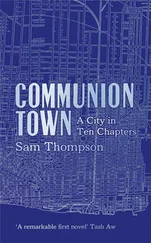Frank Tallis - Deadly Communion
Здесь есть возможность читать онлайн «Frank Tallis - Deadly Communion» весь текст электронной книги совершенно бесплатно (целиком полную версию без сокращений). В некоторых случаях можно слушать аудио, скачать через торрент в формате fb2 и присутствует краткое содержание. Жанр: Исторический детектив, на английском языке. Описание произведения, (предисловие) а так же отзывы посетителей доступны на портале библиотеки ЛибКат.
- Название:Deadly Communion
- Автор:
- Жанр:
- Год:неизвестен
- ISBN:нет данных
- Рейтинг книги:3 / 5. Голосов: 1
-
Избранное:Добавить в избранное
- Отзывы:
-
Ваша оценка:
- 60
- 1
- 2
- 3
- 4
- 5
Deadly Communion: краткое содержание, описание и аннотация
Предлагаем к чтению аннотацию, описание, краткое содержание или предисловие (зависит от того, что написал сам автор книги «Deadly Communion»). Если вы не нашли необходимую информацию о книге — напишите в комментариях, мы постараемся отыскать её.
Deadly Communion — читать онлайн бесплатно полную книгу (весь текст) целиком
Ниже представлен текст книги, разбитый по страницам. Система сохранения места последней прочитанной страницы, позволяет с удобством читать онлайн бесплатно книгу «Deadly Communion», без необходимости каждый раз заново искать на чём Вы остановились. Поставьте закладку, и сможете в любой момент перейти на страницу, на которой закончили чтение.
Интервал:
Закладка:
Netti died just before Christmas.
My father made a point of going to pay his respects. It was in his nature to do such things. He could be contrary — and his black moods made him reckless. We marched through the snow, down the hill to Netti’s house, where we were shown into the parlour to see the dead child in her casket. The room was filled with flowers. I can still remember the intoxicating scent. Long purple drapes covered the mirrors and a massive silver crucifix had been hung on one of the walls. Four candles, on large stands, filled the room with a fitful yellow light.
Netti looked exquisite. And so very still — a stillness and a breathless tranquillity that I had never seen before. In Vienna, you hear people saying that they hope to have a schone Leich — a beautiful corpse. Netti was a schone Leich. Truly.
My father said a prayer and rose to leave. I could not move. I was transfixed by Netti. I begged him to let me stay a few minutes longer so that I might say one final goodbye to my playmate. He squeezed my arm and left the room: big shoulders hunched — face grey and drawn.
I stared at Netti and felt the fluttering sensation below. It intensified until my loins were tense. I felt my flesh move.
But how to continue?
What followed is really inexpressible. Language is insufficient. I can offer you only an approximate description, a correspondent situation with which you will be familiar that reflects something of my experience. When a great cathedral organ is played, you hear music — but you can also feel the pew vibrating. What I am capable of expressing bears the same relationship to my actual experience as the vibrating pew does to the music. What I can express is only a small part of an ineffable whole.
This is what happened: I felt as though I was being watched. The impression was so strong that I turned round. But there was nobody there. Even so, this did nothing to mitigate the feeling. The evidence of my physical senses had become irrelevant. There was someone in the room — a presence. It did not cross my mind that this manifestation might be the ghost of my playmate, nor was I afraid.
I do not know how long I remained like this — watchful, curious — it may have been for some time. My father came back to collect me. Before we left, Netti’s mother kissed my forehead. Her tears froze on my skin as we stepped out into the cold.
Christmas came and went. The villagers were uneasy, fearful, and also ashamed after Netti’s death. They had not been good neighbours. My only pleasurable memory that December is of a market. I was taken to a Christkindlmarkt by one of the women, who bought me some small gifts: a candle and a fir-tree decoration, a wooden angel painted gold and red. I touched its wings and thought of my mother.
January came and with it another death.
Gerda. Poor, simple-minded Gerda.
She went skating, the ice broke, she fell through and froze to death.
Once again, I stood at the foot of an open casket. How different Gerda looked: how dignified, how composed, how still. I stood with my back to the door — to ensure that I would not be surprised — and touched myself. The pleasure that I experienced was intense, violent and strange. I was too immature to achieve a release. Instead, I experienced a muscular convulsion, followed by pains.
And then, as before, I sensed that I was not alone. The presence I had felt beside Netti’s casket had returned. Everything shifted and the next thing I can remember is waking up in my bedroom at home. I had passed out.
I was feverish and my father called the doctor. It was obvious that he was concerned about my health. I asked them if I was going to die — like Netti. The doctor said No, of course not, but he spoke without conviction. My condition got worse: sickness, weakness — I could not eat. At night I had such dreams — shadowy female figures and the sound of beating wings. I would wake in a sweat, trembling, delirious. It is impossible for me to say how long I languished in this state and I later learned that I came close to dying. And it was when my illness had taken me to the very threshold of oblivion that I saw her for the first time. Death does not come in the shape of a hooded skeleton, carrying a scythe. Death comes in the shape of an angel — and she is more beautiful than you can possibly imagine.
19
Professor Mathias was standing by a trolley, arranging and rearranging his tools. He picked up a mallet, placed it on a lower shelf, and then positioned a knife so that it was exactly level with a small chisel; however, he was clearly dissatisfied with the result. The alignment was not quite right. Shaking his head, he picked up the offending instrument, carefully put it back, and nudged it several times until a final but barely perceptible shift met with his approval.
Rheinhardt had long since abandoned trying to fathom the scheme which Professor Mathias employed to determine the appropriate placement of instruments on his trolley. Liebermann had urged him not to try since, in the young doctor’s opinion, Professor Mathias’s preparatory ritual was symptomatic of an obsessional neurosis.
The old man took a small saw, reversed its orientation, and after a considerable pause placed it on the trolley’s bottom shelf.
Mathias’s ritual was not always so lengthy and, very occasionally, he managed to proceed without its performance. There was a strong relationship between the extent of Mathias’s ritualising and his mood. The more he ritualised, the more likely it was that he would be irascible.
Mathias rolled up his shirtsleeves and moved a drill a fraction to the left.
‘Professor?’ ventured Liebermann.
‘What?’ Mathias looked up, his lips pursed. He did not like to be disturbed while making his preparations.
‘I am acquainted with a medical student who chanced to hear of your reputation.’ The professor sneered. ‘She wanted to see you at work,’ Liebermann persevered. ‘I took the liberty of inviting her.’ He studied the professor for a reaction and, when there was none, risked one more word: ‘Today.’ Still the professor did not react. ‘I hope you will not object. Of course, if you do, that is perfectly-’
‘She!’ Mathias raised his eyebrows. ‘What do you mean: “she”?’
‘The medical student is a woman, Herr professor.’
Liebermann failed to see how he could answer Mathias’s question in any other way, but he still felt foolish stating the obvious.
Mathias mumbled to himself and his expression changed from disgruntlement to weary indifference.
‘Providing she keeps out of my way and doesn’t say anything empty-headed, I have no objection.’
‘Thank you, Herr professor,’ said Liebermann, exhaling with relief.
Rheinhardt offered Liebermann a cigarette, and the two men smoked while Professor Mathias busied himself again with his tools. A large electric light was suspended above the autopsy table and twisting filaments floated across its powerful beam. Mortuary sheets had been laid over Bathild Babel’s body, but her curled right hand had slipped out from beneath the coverings: it looked small and pathetic.
As Professor Mathias finally reached the conclusion of his ritual, there was a gentle knock on the door.
‘Ah, that will be the student,’ said Liebermann.
‘Then you’d better let her in,’ said the professor.
When Amelia Lydgate entered, Liebermann took her coat and placed it on the stand. She was wearing a grey skirt and a plain white blouse, and her hair had been compressed into a tight bun.
‘Thank you so much for inviting me,’ she whispered.
‘Come — let me introduce you to Professor Mathias.’ Liebermann guided her to the autopsy table. Gesturing towards his friend he added: ‘Inspector Rheinhardt you already know.’
Читать дальшеИнтервал:
Закладка:
Похожие книги на «Deadly Communion»
Представляем Вашему вниманию похожие книги на «Deadly Communion» списком для выбора. Мы отобрали схожую по названию и смыслу литературу в надежде предоставить читателям больше вариантов отыскать новые, интересные, ещё непрочитанные произведения.
Обсуждение, отзывы о книге «Deadly Communion» и просто собственные мнения читателей. Оставьте ваши комментарии, напишите, что Вы думаете о произведении, его смысле или главных героях. Укажите что конкретно понравилось, а что нет, и почему Вы так считаете.












